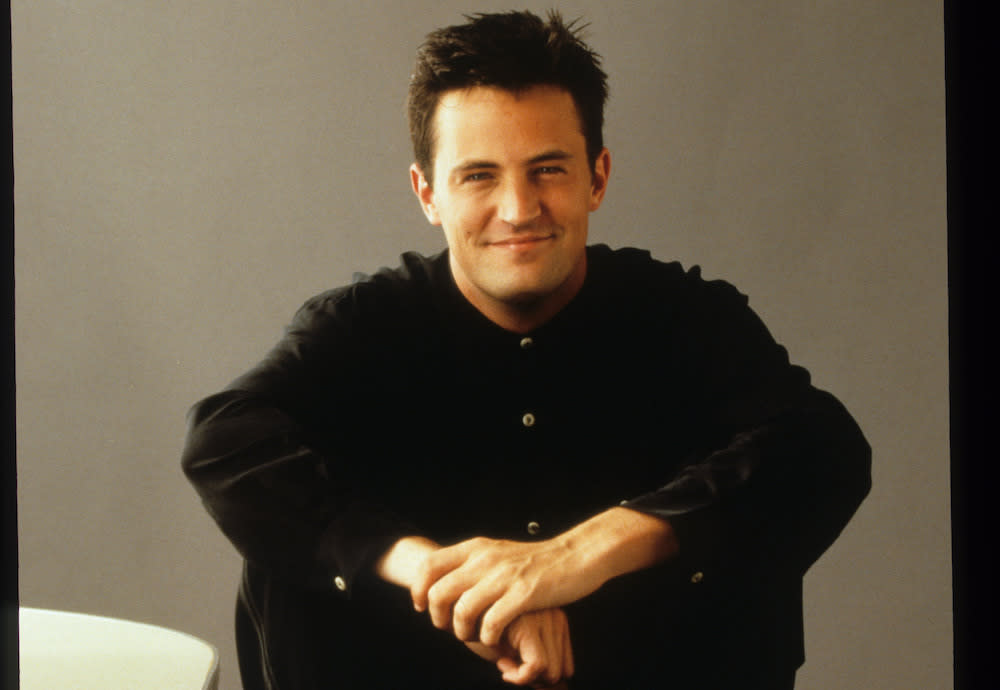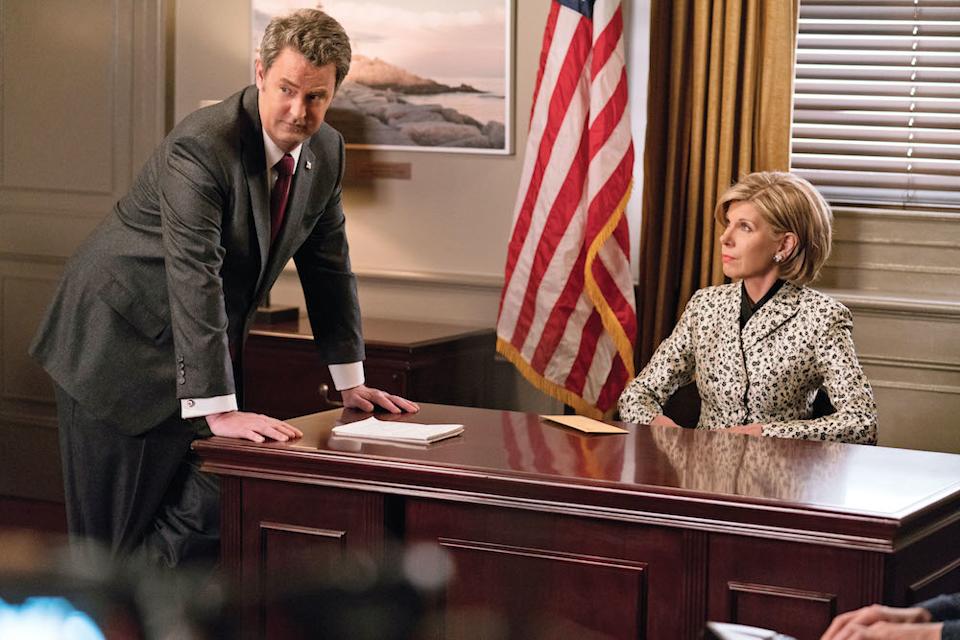Matthew Perry’s Sarcasm Made Him a Star. His Sincerity Made Him a Giant.

- Oops!Something went wrong.Please try again later.
Late in the eighth season of “Friends,” Rachel (Jennifer Aniston) comes storming into her old apartment, upset and concerned. Joey (Matt LeBlanc) has just confessed he’s in love with her, she’s told him she doesn’t feel the same way, and now the two are stuck in an awkward cycle of avoidance. Chandler (Matthew Perry), being the only one there, tries to comfort her, but his broad assurances aren’t convincing, and when challenged, all he can muster is a light joke. “I’m not great at the advice. Can I interest you in a sarcastic comment?”
That line stuck with a lot of people who watched “Friends,” and thus, it stuck with a lot of people. For one, it’s extremely relatable — not knowing what to say when a friend is hurting — but the moment also seemed to define Chandler as a character, and, to some extent, Perry’s performance of him. He tells jokes. He gets the laugh. Among a group of six highly skilled comic actors, he’s the funny one. Sarcastic quips were such an integral and invigorating part of the role, they took on a life of their own. Perry taught Sarcasm 101 when he hosted “SNL.” There are dozens of YouTube compilations highlighting the best of Perry/Chandler’s sardonic appraisals. Decades of follow-up sitcoms sought their own version of Chandler, and innumerable successors — from Max Blum on “Happy Endings” to Jim Halpert on “The Office” — are indebted to his withering yet warmhearted jesting.
More from IndieWire
The Cast of 'Friends' Pays Tribute to Matthew Perry: 'We Are All So Utterly Devastated'
'Friends' Collaborators and Fans Pay Tribute to Matthew Perry: 'Nobody Did It Better'
But that line to Rachel, so often quoted, so often leaned on as a crutch, always stuck with me for a different reason. Yes, it works as an escape hatch from an intense conversation. He doesn’t have the words for Rachel in that moment, so he falls back on wisecracks to get through it. Classic Chandler, right? Yes and no. With Perry, humor wasn’t just a defense mechanism. It wasn’t always about dodging the question. It was also the answer. His words became the words his friends needed right then and there because he, Chandler, said them, and because of the way Perry instilled each word with precise purpose.
“Friends” was a sitcom, but it, like Perry, resonates to this day because it was also sincere. There’s no separating the two, the funny from the sweet, the jokes from the sentiments. And just like his humor, Perry’s sincerity was the real deal.
For Chandler to click, along with “Friends” to land overall, his jokes had to be rooted in kindness. The series (created by Marta Kauffman and David Crane) operated under the basic principle that you shouldn’t be mean to your friends, so whenever Chandler mocks Joey for saying something mindless (“You have to stop the Q-Tip when there’s resistance.”) or pokes Ross’ oft-inflated sense of self-importance (“Someone at work ate my sandwich.” “Well, what did the POLICE say?”), it either feels necessary or playful. Chandler has a compulsive need to be liked, and he uses levity to engender that affection with unbridled enthusiasm, but he’s never cruel.
Perry infuses his observational comedy with love, making it all the easier for audiences to love Chandler in turn — especially during his initially fruitless romantic pursuits. Janice (as played by the exceptional Maggie Wheeler) is a goldmine of misplaced dreams; she’s so clearly wrong for Chandler, yet his desperation for a partner blinds our most vigilant friend from spotting her glaring flaws. Kathy (Paget Brewster) almost reverses the scenario; rather than being blissfully unaware, Chandler is painfully attuned to what’s in front of him. He’s in love with Joey’s girlfriend, and Perry’s endearing pursuit brings about some of his best moments. (The street chase! The haircut! Chandler in a box!)
It also proves Chandler — and, thus, Perry — is capable of carrying a sincere romance. Monica (Courteney Cox) and Chandler’s coupling pushes the series to its best seasons, maybe even saving it altogether. While Ross and Rachel were always the romantic backbone, “Friends” relied on Monica and Chandler to scratch that itch for the audience while the long-term couple took a much-needed break. Having Chandler and Monica’s secret affair to fall back on sparks incredible comedy, while the increasingly serious nature of their relationship once it’s out in the open only works because of the palpable chemistry between both performers.

Monica’s proposal to Chandler is where Perry proves his power, beyond impeccable timing and exacting line readings. Surrounded by candles and surprised by his partner, Chandler is overwhelmed upon entering his apartment, and he’s struck silent when Monica bends to one knee. But from there, he takes over. “You make me happier than I ever thought I could be,” he says, imbuing familiar sentiments with grand meaning. Chandler has always feared he’d be alone; that he wasn’t built for a love that lasts. His worries reflected the character’s construction, as well. Chandler didn’t have to be the love interest. Not at first. But when they needed him, Perry hit it out of the park. Throughout the teary proposal, he doesn’t crack one joke. Monica gets the two laugh lines, and even after the gang bursts in to hug them, it’s Rachel who kids an absent Ross for not being there.
Chandler is quiet. He’s touched. He’s happy.
Over the years, Perry’s Emmy-nominated role on “Friends” took on added dimension. He ferociously battled addiction, including most of his 10 seasons playing Chandler, and the iconic character’s lingering melancholy, routinely masked by an onslaught of jokes, became inextricable from the actor playing him. Perry would confront the darker aspects of himself and his humor in follow-up sitcoms like “Go On” (as a grieving widower) and “Mr. Sunshine” (a manager of a sports arena who’s plagued by disappointments and chaos). Neither show would last, perhaps because the parallels between part and player were too clear. His “Go On” character, Ryan King, is a sportscaster whose job in the public eye forces him into a support group so he can mourn his wife while getting back to work. Ben Donovan (his role on “Mr. Sunshine”) has to watch the love of his life date his best friend, every day, because they all work together. Sadness hung over Perry’s post-“Friends” work, even when fans made it clear they only wanted him to be happy — or, at least, fake it.
Aaron Sorkin’s serious take on sketch comedy, “Studio 60 on the Sunset Strip,” is the most notorious flop, though Perry found repeated success in dramatic roles. Three of his five Emmy nominations came for dramas (two guest stints on “The West Wing,” which led to “Studio 60,” and his lead role in the TNT movie, “The Ron Clark Story”), and his work with Robert and Michelle King in “The Good Wife” and “The Good Fight” flashed a level of villainous potential only available to him once he got some distance from Chandler Bing. Watch “The Good Fight” Season 1, Episode 4, where his deceitful lawyer Mike Kresteva cooks up one doozy of a dastardly con. Perry’s eyes, when forced to reckon with how brazen a fraud he’s embarked upon, betray no regret, no sadness. Instead, there’s a level of understanding and acceptance that’s terrifying in its debasement (and familiarity).
Perry’s untimely passing feels especially tragic in this light. Given last year’s candid autobiography, the chapter-closing nature of 2021’s “Friends” reunion, and the growing opportunities for him outside of sitcoms, a second act felt imminent. Perry had plenty more to give. Even at Chandler’s cultural peak, it was clear the man behind him wasn’t purely a comic. He could go big, and his skill as a humorist cannot be overstated, but so many of his greatest lines were pithy or tossed off. They found the honesty in the moment, his sarcasm grounded in natural timing that made even the baldest jokes fit the conversational patter. Like the other “Friends,” he made you believe Chandler could be part of your group at home; like he could plop down next to you at the coffee house or pop in to your apartment for Thanksgiving. Sure, Perry was the funny one. But he was also a real one.
Best of IndieWire
The Best LGBTQ Movies and TV Shows Streaming on Netflix Right Now
Guillermo del Toro's Favorite Movies: 54 Films the Director Wants You to See
Nicolas Winding Refn's Favorite Films: 37 Movies the Director Wants You to See
Sign up for Indiewire's Newsletter. For the latest news, follow us on Facebook, Twitter, and Instagram.

